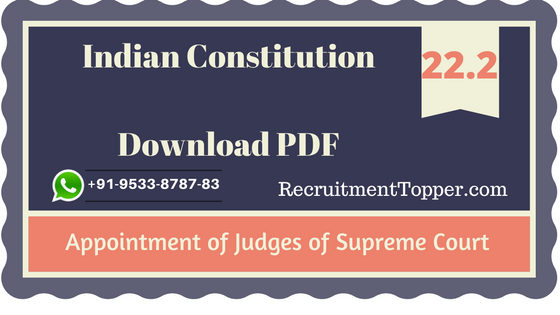Appointment of Judges of Supreme Court | Indian Constitution
Every Judge of the Supreme Court shall be appointed by the President of India. The President shall, in this matter, consult other persons besides taking the advice of his Ministers. In the matter of appointment of the Chief Justice of India, he shall consult such Judges of the Supreme Court and of the High Courts as he may deem necessary. A nine judge Bench of the Supreme Court has laid down that the senior most Judge of the Supreme Court considered fit to hold the office should be appointed to the office of Chief Justice of India. And in the case of appointment of other Judges of the Supreme Court, consultation with the Chief Justice of India, in addition to the above, is obligatory [Art. 124(1) Consultation would generally mean concurrence. The above provision, thus, modifies the mode of appointment of Judges by the Executive—by providing that the Executive should consult members of the Judiciary itself, who are well-qualified to give their opinion in this matter.
In a reference (not as a review or reconsideration of the Second Judges case) made by the President under Art. 143 relating to the consultation between the Chief Justice of India and his brother judges in matters of appointment of the Supreme Court Judges and the relevance of seniority in making such appointments, the nine judge Bench opined:
1. The opinion of the CJI, having primacy in the consultative process and reflecting the opinion of the judiciary, has to be formed on the basis of
consultation with the collegium, comprising of the CJI and the four senior most Judges of the Supreme Court. The Judge, who is to succeed the CJI should also be included, if he is not one of the four senior most Judges. Their views should be obtained in writing.
2. Views of the senior most Judges of the Supreme Court, who hail from the High Courts where the persons to be recommended are functioning as
Judges, if not the part of the collegium, must be obtained in writing.
3. The recommendation of the collegium along with the views of its members and that of the senior most Judges of the Supreme Court who hail from the High Courts where the persons to be recommended are functioning as Judges should be conveyed by the Chief Justice of India to
the Govt, of India.
4. The substance of the views of the others consulted by the Chief Justice of India or on his behalf, particularly those of non judges (Members of the Bar) should be stated in the memorandum and be conveyed to the Govt, of India.
5. Normally, the collegium should make its recommendation on the basis of consensus but in case of difference of opinion no one would be appointed, if the CJI dissents.
6. If two or more members of the collegium dissent, CJI should not persist with the recommendation.
7. In case of non-appointment of the person recommended, the materials and information conveyed by the Govt, of India, must be placed i before the original collegium or the reconstituted one, if so, to consider whether the recommendation should be withdrawn or reiterated. It is only if . it unanimously reiterated that the appointment must be made.
8. The CJI may, in his discretion, bring to the knowledge of the person recommended the reasons disclosed by the Govt, of India for his non appointment and ask for his response thereto, which, if made, be considered by the collegium before withdrawing or retirating the recommendation.
9. Merit should be predominant consideration though inter-seniority among the Judges in their High Courts and their combined seniority on all India basis should be given weight.
10. Cogent and good reasons should be recorded for recommending a person of outstanding merit regardless of his lower seniority.
11. For recommending one of several persons of more or less equal degree of merit, the factor of the High Courts not represented on the Supreme Court, may be considered.
12. The Judge passed over can be reconsidered unless for strong reasons, it is recorded that he be never appointed.
13. The recommendations made by the CJI without complying with the norms and requirements, are not binding on the Govt, of India.
More Resources

Leave a Reply